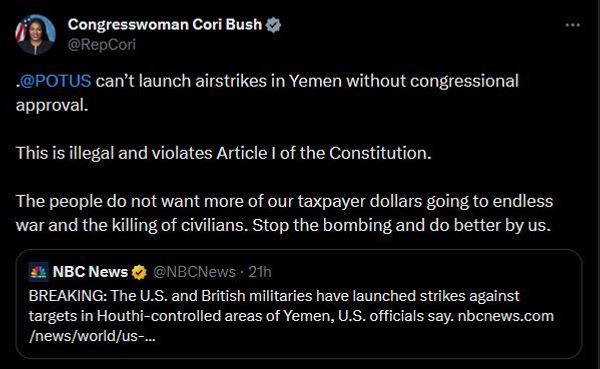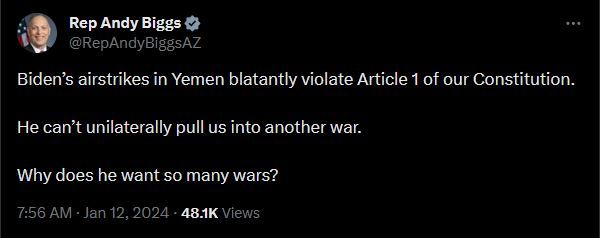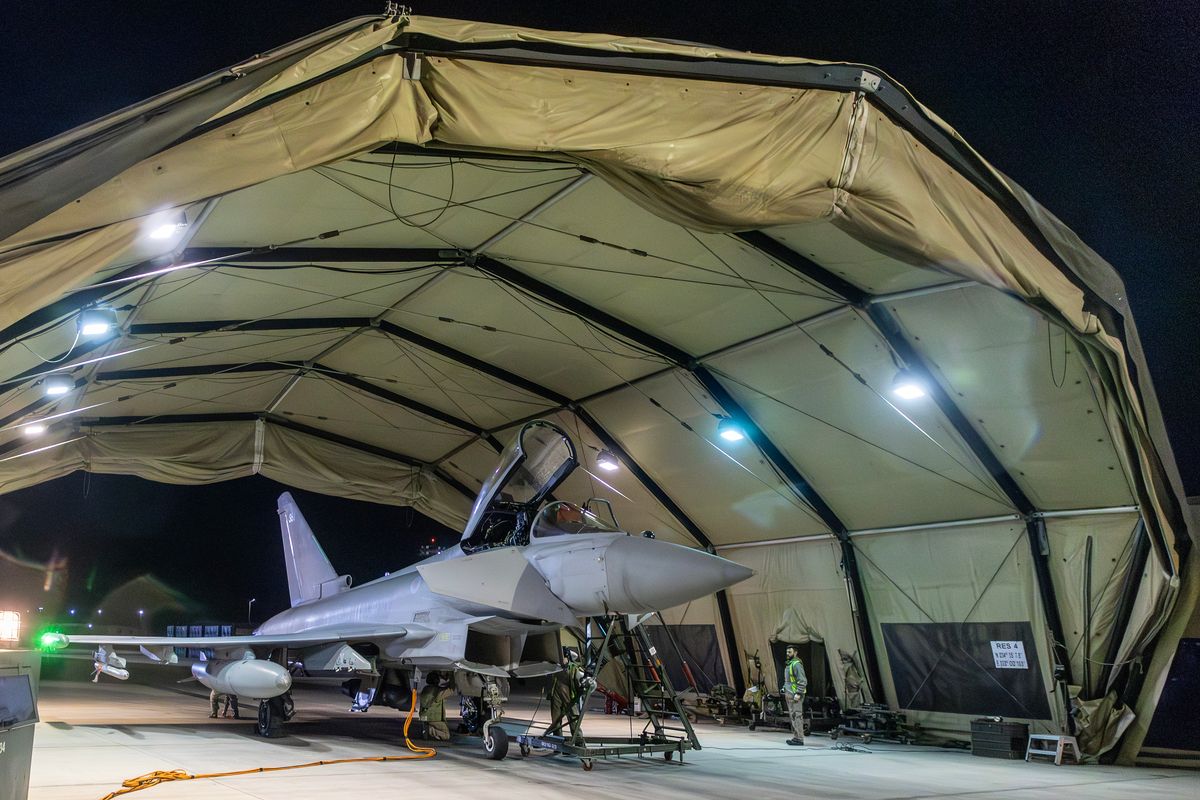On Jan. 11, 2024, U.S. President Joe Biden announced that he had ordered airstrikes against areas in Yemen controlled by the Houthi movement, one of the sides in the Yemeni Civil War. The airstrikes immediately led to bipartisan backlash from members of Congress claiming that Biden had overstepped his bounds and that the airstrikes were unconstitutional without congressional aproval.


Here's what you need to know about what's going on in Yemen and the airstrikes:
The Yemeni Civil War
The Houthi movement started in the 1990s as a response to ongoing corruption in Yemen and as a protest against Saudi Arabian influence in the country. Beginning in 2004, the Houthis started actively rebelling against the Yemeni government, which continued for 10 years. In 2014, the Houthis captured Sana'a, the capital of Yemen, and since then, the county has been in a state of full civil war.
In 2015, a coalition led by Saudi Arabia attempted to restore the Yemeni government to power and failed, and the conflict has since stagnated into the most notable proxy war between Saudi Arabia, which supports the Yemeni government, and Iran, which backs the Houthi movement. The war has killed over 150,000 and led to widespread famine in the country, the poorest in the Middle East.
In April 2022, the United Nations helped to broker a ceasefire between the two sides, which has largely held up, as of this writing. According to reports from The Associated Press, there has since been a prisoner exchange and a Houthi delegation was invited to Saudi Arabia in September 2023 for peace talks that ended with "positive results."
Why Did Biden Order Airstrikes?
Ships wishing to use the Suez Canal to transport goods between Europe and Asia must pass through Yemeni waters in the Red Sea, the Bab el-Mandeb strait and the Gulf of Aden. The Houthis have occasionally launched missiles at ships passing through the area, and following the beginning of the Israel-Hamas war in October 2023, the group upped the attacks, justifying them as a response to Israel's invasion of the Gaza Strip. On Dec. 18, 2023, U.S. Defense Secretary Lloyd Austin announced Operation Prosperity Guardian, a multinational mission to protect ships traveling through the area.
However, the attacks continued. On Jan. 10, 2024, the Houthis launched 18 drones, two cruise missiles and one anti-ship missile, the largest attack thus far, which the British and American navies shot down. No damage was caused in the attacks. The next day, the 15 members of the U.N. Security Council voted 11-0 for a resolution condemning the Houthi attacks, with China, Russia, Algeria and Mozambique abstaining from the vote. On the same day, President Biden ordered the airstrikes with support from the U.K., Australia, Bahrain, Canada and the Netherlands.
The War Powers Act
Under Article I, Section 8 of the U.S. Constitution, only Congress is given the power to declare war, a power it has exercised only 11 times, most recently in World War II. However, Article II, Section 2 reads "[t]he President shall be Commander in Chief of the Army and Navy of the United States, and of the Militia of the several States, when called into the actual Service of the United States."
As a result of that separation of power, how much the President can do militarily without an official declaration of war has been long and fiercely debated. Since World War II, all the conflicts currently labeled as wars have been fought without the official war declaration (possibly due to the threat of nuclear retaliation), but just how far a president can go without an official declaration of war was first challenged during the Vietnam War.
Although both Dwight D. Eisenhower and John F. Kennedy placed troops in South East Asia, it was not until the Gulf of Tonkin Resolution in 1964 that Congress authorized Lyndon B. Johnson to “take all necessary measures to repel any armed attack against the forces of the United States and to prevent further aggression" in Vietnam.
By the time Richard Nixon was elected, public sentiment had started to turn against the war. So, when Nixon ordered the bombing of Cambodia in March 1969, he did so in secret. The revelation that the United States had been secretly bombing a neutral country was only revealed to the public a few months later in The New York Times. In April 1970 (after a U.S.-backed coup, by the way), Nixon ordered a ground invasion of Cambodia to target North Vietnamese supply routes in the country. That invasion was announced publicly two days after it began. It was the last straw for war-weary Americans and their congressional representatives. The Kent State Massacre and Jackson State Shootings happened at protests against the invasion of Cambodia. Congress agreed that Nixon had overstepped his boundaries and the Gulf of Tonkin Resolution was repealed in June 1970. The Vietnam War continued regardless.
It was not until 1973 that Congress passed the War Powers Act (over Nixon's veto). That act requires the president to communicate to Congress a committal of U.S. troops within 48 hours of the order being given, and to withdraw the troops after 60 days if Congress has not expressly approved the action. Over the last 50 years, the War Powers Act hasn't proved to be that effective. According to Cornell University's Legal Information Institute, presidents since the law was passed have considered the act to be unconstitutional and therefore simply ignore it as they see fit.
So, Were Biden's Airstrikes Unconstitutional?
There are two options for how the Biden Administration could choose to justify the airstrikes.
The first is precedent, because the airstrikes on Houthi territories were not the first time a President has ordered a military action without seeking congressional approval. An article from Al Jazeera listed Biden's first military action in Syria, Trump's drone strike that killed Iranian general Qassem Soleimani, Obama's 2011 bombing of Libya and Bill Clinton's bombing of Serbia in 1999 as examples of times the president has ordered airstrikes without consulting Congress.
The second is by citing one of a few different pieces of legislation. He might cite the War Powers Act itself, claiming that it gives him the power to retaliate against an attack made against the United States. He could also refer to the Authorization of Use of Military Force (AUMF) against terrorism signed by Congress after 9/11, which was used to justify the wars in Iraq and Afghanistan. However, the Houthis are not currently listed as a terrorist organization, making it much harder to justify the attacks using the AUMF.
On Jan. 11, the White House issued a statement co-signed by Australia, Bahrain, Canada, Denmark, Germany, the Netherlands, New Zealand, South Korea and the UK claiming that the strikes were an "inherent right of individual and collective self-defense, consistent with the UN Charter."
However, Biden faced backlash from both sides of the aisle for his decision. Since most presidents consider the War Powers Act to be unconstitutional, it very well could be a future court decision that ultimately decides exactly how much power the president has. For now, the question of whether Biden's airstrikes in Yemen were constitutional or unconstitutional is a matter of opinion.
